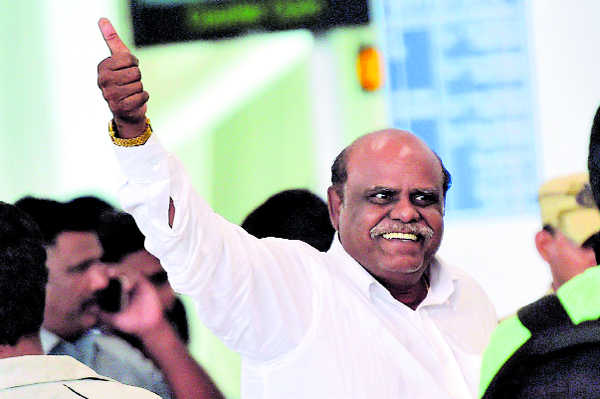
Justice CS Karnan at Chennai airport after his arrest. PTI
Satya Prakash
The former Calcutta High Court judge CS Karnan who was on the run has finally been arrested and put behind bars, giving effect to the May 9 unprecedented verdict of a seven-judge Bench of the Supreme Court that held him guilty of contempt and awarded a six-month prison term.
But instead of offering a sense of closure to those keenly watching the affairs of the judiciary, it has generated a feeling of unease and concern over the manner in which Justice Karnan’s judicial misadventures were dealt with by use of power of contempt of court.
The adverse publicity it attracted has dented the image of the judiciary in India and abroad. It also raises questions over the opaque collegium system of judicial appointments and the in-house mechanism to deal with delinquent judges.
There is no doubt that among the four pillars of democracy, the judiciary enjoys the highest respect and credibility among the masses. But a series of scandals has hit the judiciary since the turn of the millennium – one after the other – Justice Karnan episode being the latest, leaving much to be desired from the institution.
One would also hardly disagree with the fact that Justice Karnan’s orders and utterances crossed all limits of decency, judicial propriety and discipline. In particular, his orders against Chief Justice of India JS Khehar and six other top-court judges crossed the threshold level, testing their judicial tolerance.
But there are many unanswered questions.
First, how come an advocate like CS Karnan got to be appointed as a judge of the Madras High Court?
Second, even if he was appointed as an Additional Judge, why and how was he confirmed as a Permanent Judge?
Third, Justice Karnan has been indulging in judicial misadventures of the worst kind and creating unsavoury scenes in courts much before the Supreme Court initiated contempt proceedings against him. Why didn’t the Supreme Court Collegium recommend to the government to take steps to remove Justice Karnan? In August 2009, the then CJI K G Balakrishnan had written to the Prime Minister recommending removal of Calcutta High Court Judge Soumitra Sen.
Instead of initiating contempt proceedings against a sitting high court judge, the apex court could have waited for his retirement as suggested by senior counsel KK Venugopal. After all, the order sentencing Justice Karnan to jail virtually amounted to removing him as a judge, the power for which only vests in Parliament.
Indian judiciary has often been accused of usurping the powers of other organs of the State, namely the legislature and the executive. What if the issue is raised by MPs in Parliament?
It’s not just about a deviant judge named Justice CS Karnan, it’s about creating a precedent without offering clear cut answers to a constitutional quagmire that has the potential to undermine the sense of independence that high court judges enjoy being holders of constitutional positions. Let’s not forget that unlike the subordinate courts which function under the superintendence of their respective high court, the Constitution envisages high courts as independent entities not under the administrative control of the Supreme Court.
These questions allude to a systemic failure in dealing with errant judges in India. The Justice Karnan saga highlights the dire need to examine the existing system and take remedial measures at the earliest.
There have been several instances where the collegium system appointed poor-quality judges who gave a bad name to the judiciary. Be it Justice PD Dinakaran, Justice Soumitra Sen, Justice Nirmal Yadav or Justice Karnan — the in-house mechanism has proved to be useless.
And, the only available option of impeachment – described as ‘Brahmastra’ by many – has never been successful for a variety of reasons, including political. Attempts to have a specific law to deal with deviant judges of the higher judiciary have not been successful.
In his book “Working a Democratic Constitution: The Indian Experience”, noted jurist Granville Austin wrote, “An independent judiciary begins with who appoints what calibre of judges.”
The real problem lies in the faulty collegium system of judicial appointments under which judges appoint judges under a process wrapped in secrecy. The attempt to replace it failed after the Supreme Court unfortunately struck down the National Judicial Appointments Commission in the name of judicial independence and revived the opaque collegium system with the promise that it would be made transparent.
It has been 18 months since a Constitution Bench ordered the government to draft a revised Memorandum of Procedure (MoP) to make it transparent in consultation with the Supreme Court collegiums, but there doesn’t appear to be much progress on the contentious issue.
On March 20, Chief Justice of India JS Khehar said the MoP for appointment of judges had finally been cleared. But Law Minister Ravi Shankar Prasad contradicted him last week when he said, “It (MoP) is a work in progress.”
Doctors often say, “Prevention is better than cure”. It is high time the judiciary and the government took note of it and put in place an appointment system that prevents undeserving candidates from becoming judges, thereby avoiding recurrence of such ugly episodes in future.



























